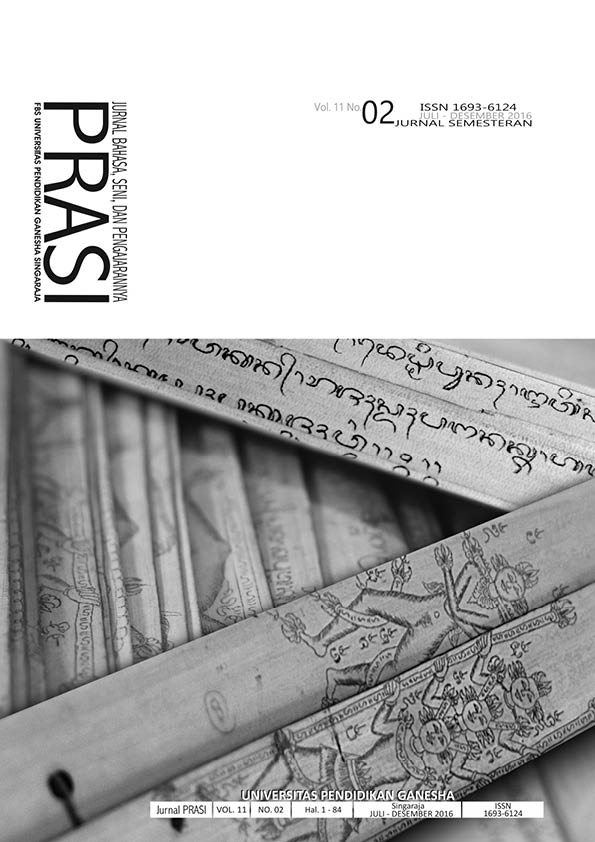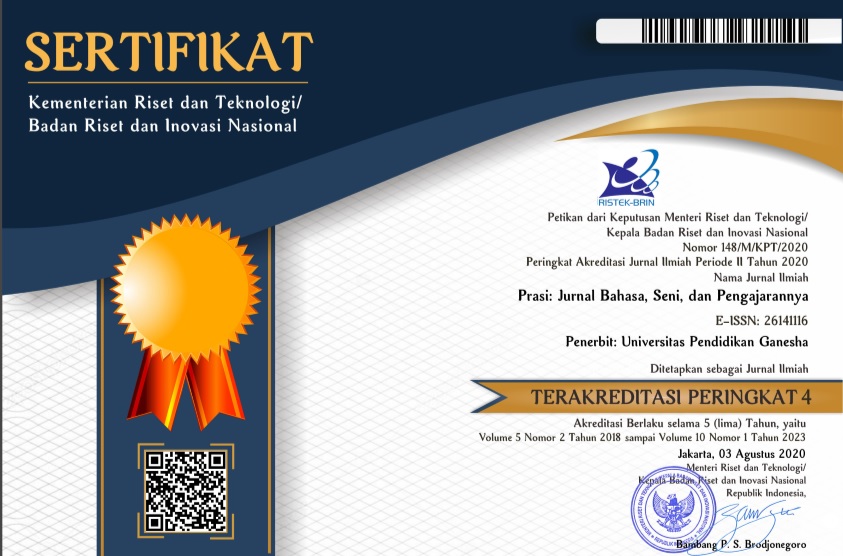PENGARUH METODE PEMBELAJARAN BERBASIS PROYEK DAN SELF-EFFICACY TERHADAP KOMPETENSI MENULIS SISWA
DOI:
https://doi.org/10.23887/prasi.v11i02.11137Abstract
This research aimed at investigating the effect of project based learning method and self-efficacy on students’ writing competency. It was an experimental study of posttest-only control group with 2x2 factorial design in which there were twelve treatments lasted from February 2012 until the end of March 2016. For the accomplishment of the study, 84 of the seventh grade students of SMP Negeri 1 Denpasar in the academic year 2015/2016 were selected to be the sample. The data of this study were collected through self-efficacy questionnaire and writing competency test which were analyzed using Two-way ANOVA and Tukey test. The findings of the research are: (1) students who were taught by using project based learning method can significantly achieve better in writing than thosewho were taught by using conventional method, (2) there is a significant interactional effect of project based learning method and self-efficacy toward students’ writing competency, (3) for high self-efficacy students who were taught by using project based learning method achieved significantly better than those who were taught using conventional method, (4) for low self-efficacy students, there is no significant difference between those who were taught by using project based learning method and those who were taught by using conventional method. The results of the study imply that the implementation of project in writing with the consideration of students’ self-efficacy is worth to be considered for developing students’ writing competency. Keywords: project based learning, self-efficacy, writing competency ABSTRAKPenelitian ini bertujuan untuk menyelidiki pengaruh metode pembelajaran berbasis projek dan self-efficacy terhadap kompetensi menulis siswa. Ini merupakan penelitian eksperimen dengan menggunakan rancangan penelitian posttest-only control group design dengan faktorial 2x2. Dalam penyelesaian penelitian ini, 84 siswa kelas VII di SMP Negeri 1 Denpasar pada tahun pembelajaran 2015/2016 dipilih sebagai sampel. Data penelitian ini dikumpulkan melalui kuesioner self-efficacy dan tes kompetensi menulis yang selanjutnya dianalisis dengan menggunakan ANAVA dua jalur dan tes Tukey. Temuan-temuan penelitian ini meliputi (1) siswa yang belajar dengan metode pembelajaran berbasis projek mampu meraih hasil yang lebih baik secara signifikan dalam menulis daripada siswa yang belajar dengan strategi konvensional, (2) terdapat efek interaksi yang signifikan antara metode pembelajaran yang digunakan dan self-efficacy, (3) untuk siswa yang memiliki self-efficacy tinggi, mereka yang belajar dengan menggunakan metode pembelajaran berbasis projek mampu mencapai hasil yang lebih baik secara signifikan dalam menulis dibandingkan dengan mereka yang belajar dengan menggunakan metode konvensional, (4) untuk siswa yang memiliki self-efficacy rendah, tidak ada perbedaan yang signifikan dalam kompetensi menulis antara mereka yang belajar dengan menggunakan metode pembelajaran berbasis projek dan metode konvensional. Temuan-temuan penelitian ini menyiratkan bahwa pengimplementasian metode menulis dengan menggunakan metode pembelajaran berbasis projek dan juga mempertimbangan self-efficacy siswa patut untuk dipertimbangkan untuk mengembangkan kompetensi siswa dalam menulis. Kata kunci: pembelajaran berbasis projek, self-efficacy, kompetensi menulis
Downloads
Published
2016-12-31
Issue
Section
Articles
License
Authors who publish with Prasi agree to the following terms:- Authors retain copyright and grant the journal the right of first publication with the work simultaneously licensed under a Creative Commons Attribution License (CC BY-SA 4.0) that allows others to share the work with an acknowledgment of the work's authorship and initial publication in this journal
- Authors are able to enter into separate, additional contractual arrangements for the non-exclusive distribution of the journal's published version of the work (e.g., post it to an institutional repository or publish it in a book), with an acknowledgment of its initial publication in this journal.
- Authors are permitted and encouraged to post their work online (e.g., in institutional repositories or on their website) prior to and during the submission process, as it can lead to productive exchanges, as well as earlier and greater citation of published work. (See The Effect of Open Access)


.png)
.png)









